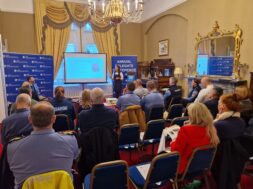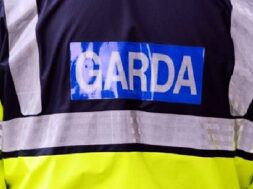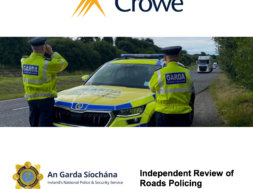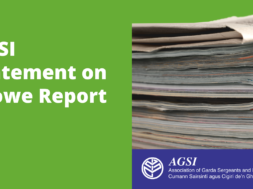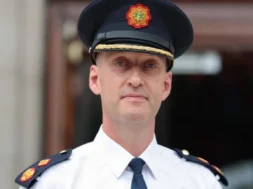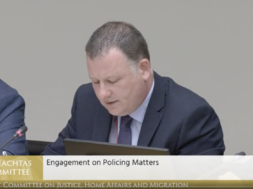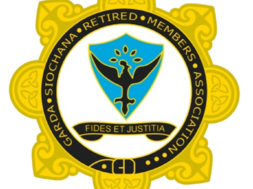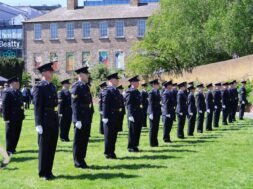Check Against Delivery
Statement by the Minister for Justice, Equality and Defence, Alan Shatter TD,
on Matters Relating to An Garda Síochána
26 March 2014
A Cheann Comhairle
Could I start by again paying tribute to Martin Callinan on his retirement as Commissioner of An Garda Síochána.
Martin Callinan had a long and distinguished service in An Garda Síochána. He dedicated his career to the fight against crime, and has a record of which he can justly be proud. I want to express my sincere thanks for his commitment and service to the State.
In its statement yesterday, the Government indicated that information had come to light indicating that a system for the recording of phone calls to and from many Garda stations had been in place for many years before it was discontinued last November. The fact that such a system was in place, and for so long, is clearly a matter of serious concern, which the Government believes warrants the establishment of a Commission of Investigation.
Let me say at the outset that the circumstances surrounding the establishment of this system of recording, exactly when it started, the number of Garda stations involved, the extent to which recordings were retained, and their relevance to any Garda investigations are still unclear. One of the main functions of the Commission of Investigation will be to establish the facts relating to these and all other relevant issues.
I recognise of course that Deputies will have many very reasonable questions on these and other aspects of this matter, but I am greatly constrained in what I can say. We need to establish the facts before we can draw any firm conclusions, and it would be wrong to engage in speculation in advance of that.
Let me, however, say what I know from a letter by the outgoing Garda Commissioner, Martin Callinan. This letter was sent to my Department on 10 March, and was made under section 41 of the Garda Síochána Act 2005, which provides a mechanism for the submission of information by the Garda Commissioner. This letter was not furnished to me by my officials until approximately 1240 pm yesterday and I did not have an opportunity to read and consider it until some time later.
The letter started off by referring, by way of background, to a case in which civil proceedings are being taken by two persons against the Garda Síochána and the State for wrongful arrest and related matters. Can I say here that I am aware of speculation on the identity of these proceedings, but the House will understand that I cannot comment on proceedings currently before the courts. The letter from the Garda Commissioner referred to recordings of telephone conversations into and out of a particular Garda station which had come to light as part of the process of discovering documents of relevance to the plaintiffs. That process is still under way, and again I must emphasise the constraints on commenting on a case which is currently being litigated in the courts.
I am advised that my Departmental officials were made aware of recordings of relevance to the specific civil proceedings previously mentioned on 28th February by the Garda Síochána and the Chief State’s Solicitor’s office arising from its involvement in the response to the civil proceedings. I am informed that what was at issue was the discovery of recordings in a specific Garda station, not a more general system of recording calls in Garda stations generally and that no reference to such general recording of calls was made at that time.
In this letter of 10th March, the Garda Commissioner went on to say that it had subsequently transpired that systems would appear to have been installed during the 1980s in Garda stations to allow for the recording of incoming and outgoing calls from designated extensions. The Commissioner explained that the rationale behind this was the recording of Garda radio traffic to and from control rooms, and 999 calls, and the gathering of evidence around calls made to Garda stations regarding bomb threats and other code messages. This practice had continued in some stations over the years, with the recordings being retained within each station, with the original recorders being replaced in the 1990s and again in 2008. The letter states that the original recorders were replaced with dictaphone recorders during the 1990s (I do not presently know what specific years), and further replaced by what is referred to as NICE recorders, which I understand is a brand name, which were installed in 2008.
The Commissioner explained that he had consulted the Attorney General’s office on the matter, and expected that consultation with the office of the Data Protection Commissioner would be necessary, as well as further advice from the office of the Attorney General. However, he made clear in the letter that he had directed that the routine recording of non-999 calls to Garda stations should cease, and he confirmed that all recordings except those made on dedicated 999 lines were fully stopped nationally on 27 November 2013.
In relation to the continued recording of 999 calls, which I think everyone would instinctively understand, the Commissioner, in his letter, explained that there was a legislative underpinning of such recording contained an Act of 2007.
The Commissioner went on to say that he was awaiting written confirmation from each Divisional Officer that all audio recordings that had been stored at each Divisional Headquarters outside Dublin had been collected and were now stored securely at Garda Headquarters. The Commissioner noted that the total amount of tapes collected at that stage was 2,485.
The issue the Commissioner identified in the letter was the action he should now take in relation to these recordings, and he particularly referenced his role as Data Controller in respect of the recordings. He stated that he had consulted the Attorney General’s office on 11th November 2013 and established a Working Group to report to him on the issue and that he expected that consultation with the office of the Data Protection Commissioner would be necessary, as well as further advices from the Attorney General. Whilst the Attorney General, in the context of the civil proceedings previously mentioned, was made aware of the existence of tapes, and the possible existence of other tapes, I am advised that she had no knowledge at that time of the circumstances surrounding the making of tapes, the legal background to their being made, the contents of such tapes, or the number of such tapes.
I understand that on the day the letter from the Commissioner was received there was a consultation held with the senior counsel representing the state in this case to discuss the issues arising, I also understand that on the day after the receipt of this letter of the 10th March in my Department, that is to say 11th March 2014, there was a follow-up meeting between the Garda Commissioner, the Department of Justice and the office of the Attorney General, and I am advised that the discussion covered the ongoing legal consultation in relation to the civil proceedings. I also understand that the matters covered in the letter of 10th March were being considered by my Department in the context of the ongoing legal consultation in relation to the specific case in question and I am informed that, subsequently, on 19 and 20 March 2014, Garda Headquarters copied my Department with correspondence between the Garda Síochána and both the office of the Attorney General and the office of the Data Protection Commissioner. As Members of the House may be aware, I flew to Mexico to undertake my duties in respect of Government Ministers St Patrick’s Day arrangements on 15th March and did not return until the 21st March. I was not briefed on this matter until approximately 6pm on Monday 24th March 2014 in the Department of Justice and, as previously stated, was first furnished with the letter from the Garda Commissioner of 10th March 2014 yesterday at approximately 1240 pm. Following the initial briefing by my Departmental officials, I met together with both the Taoiseach and the Attorney General on Monday evening to discuss these matters.
I know that there are reports that I knew of the system of recording in Garda stations last year, but this is not the case. Reference has been made, for example, to a case investigated by GSOC of a member of the public who was assaulted by members of the Garda Síochána in Waterford. GSOC, I have since learnt, reported on this on 16th June of last year and did make reference in their report to the recording of phone calls in Waterford Garda Station. However, this was not a report to me or my Department but a press release by GSOC and there was no indication or suggestion of any nationwide system of recording in Garda Stations. I am aware of various commentators referencing this short GSOC report in broadcast and print media since the Governments statement was published yesterday afternoon on this issue and questioning the truthfulness of the account given to date of these matters. Unfortunately, we live in a world where, regardless of the issue, some commentators and opposition Deputies, on first learning of an issue detailed by Government of which they were unaware, feel compelled to accuse those who make the issue known, and seek to address it, of telling untruths or of some incompetence. It is something of an industry, and with Members opposite, a wearisome repetitive refrain followed by the usual dosage of contrived outrage. The simple truth is GSOC did not furnish the report mentioned to me and I am advised that they did not furnish it to my Departmental officials nor bring it to the Departments attention. GSOC no doubt can confirm that. Because of the background to the GSOC Report, GSOC had no obligation under the 2005 Act to furnish it to me but did have a discretion to furnish it to any “person that the Commission considers has a sufficient interest in the matter”. GSOC obviously did not regard this report as of sufficient importance to furnish it specifically to me or my Department, but issued it as a press release. It also seems, from the checking my officials have been able to undertake to date, that no Deputy in this House regarded the publication of sufficient importance to table a Dail question on it but I am open to correction on that. It may be the case that no Member of this House read this report until yesterday or, if they did, they placed no importance on it. Insofar as it received any media coverage, it does not appear as if any member of the media regarded the report as of any major importance. Again, I am open to correction. This is understandable as the report gives no insight into the extent of recordings made by An Garda Siochana, nor did GSOC determine it an issue worthy of further investigation. GSOC could, if they wished, have initiated a public interest investigation into the matter under Section 102 (4) of the Garda Siochana Act 2002. Had they done so, they would also have had to notify me of such investigation under Section 103 (1) (b) of the Act unless GSOC invoked Section 103 (2) but I cannot see how that subsection could be of relevance. In case I am misunderstood, I am making no criticisms of any nature of GSOC. I am merely setting out what is the position.
These are the facts as I have been informed of them, but of course there are many questions which need to be answered. That is why the Government has decided that it is necessary to establish the facts and has announced that there will be a statutory inquiry.
It is absolutely right that all these matters should be independently examined, and I will not hesitate to seek further inquiries into any other matters should this prove necessary. It is unfortunate that Members of this House could not, until they learned more of these matters, resist the temptation to engage in their usual political attacks. It would be refreshing if, for once, Members opposite could restrain themselves from engaging in the usual party political point scoring and deal with the substance of issues.
We are dealing here with a system of recording phone calls into and out of some Garda stations over a period of up to 30 years. As with other matters under investigation, these are issues which far pre-date my tenure as Minister for Justice. This issue, like others, is one that existed throughout the lifetime of the previous government and, indeed, we now know the recording system was upgraded during that government’s term of office in 2008. We also know that a legislative basis was given, in 2007, to ensure the legality of emergency 999 calls. I do not know whether my predecessor in this office or any member of the previous government was any more aware of these recordings than I was until Monday evening of this week and I will not make any accusations in that regard.
As well as announcing yesterday a statutory inquiry into these matters the Government also announced that it will establish an independent Garda authority, while maintaining appropriate democratic accountability to the Oireachtas. This will be a hugely significant development in the governance and oversight of the Garda Síochána, a development previously rejected by the main Party opposite. The Government has also announced that the next permanent appointment to the post of Garda Commissioner will be by way of an open competition, another historic development, and another reform rejected by the main party opposite, even though it was recommended by an expert group appointed to make recommendations on Garda reform.
There is also, of course, a comprehensive review taking place of the Garda Síochána, which has very recently commenced under the Haddington Road Agreement. This will independently examine all aspects of the Force, including remuneration, terms and conditions, industrial relations, and the structure, organisation and management of the Force. We also await the outcome of the Judge Cooke Inquiry and the Sean Guerin Inquiry.
We must not forget, either, the strong legislation being taken through this House by Minister Brendan Howlin to protect whistleblowers. The Public Disclosures Bill, which will apply to the Garda Síochána and indeed the entire public and private sectors, will provide best international standard protection for whistleblowers.
I don’t think that any reasonable person could claim with any credibility that there has been any inaction on my part or the part of the Government to what has undoubtedly been a series of disturbing issues. Rather, we have been unflinching in our determination to face up to past difficulties. So let us now await the outcome of these inquiries, and in this case the outcome of the Commission of Investigation into the recording of phone calls. I am seeking a full report from the acting Garda Commissioner, Noirin O’Sullivan, on the latest available information on these recordings so that the Government can take an informed decision on the terms of reference of the Commission of Investigation. This House will have the opportunity to consider that matter, and I look forward to hearing the views of members.
ENDS

